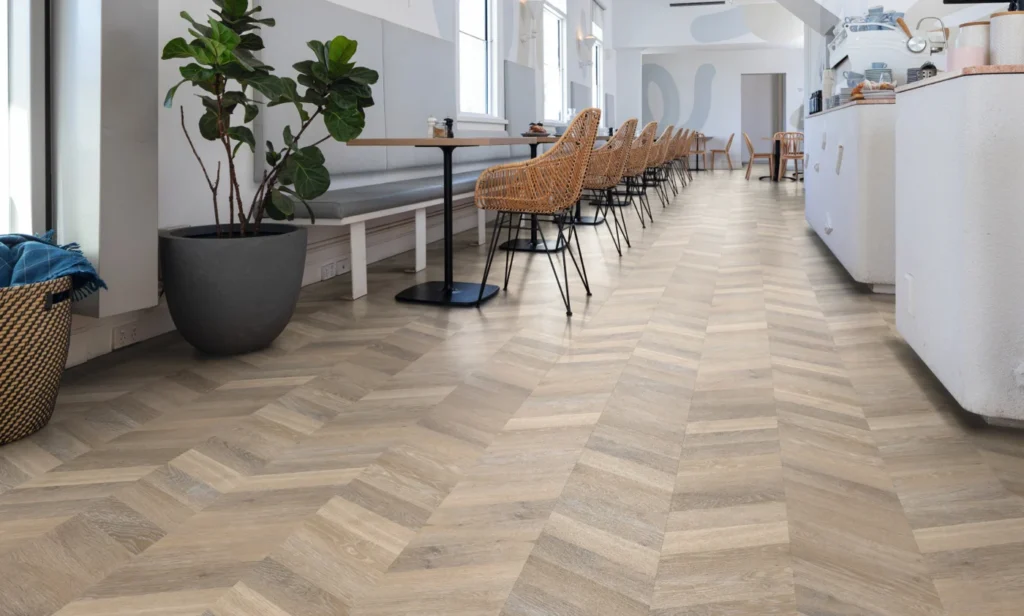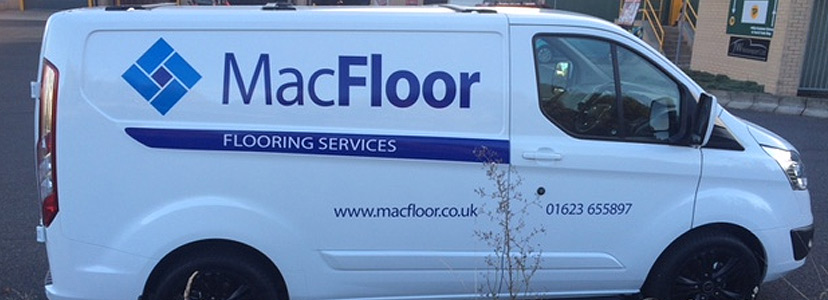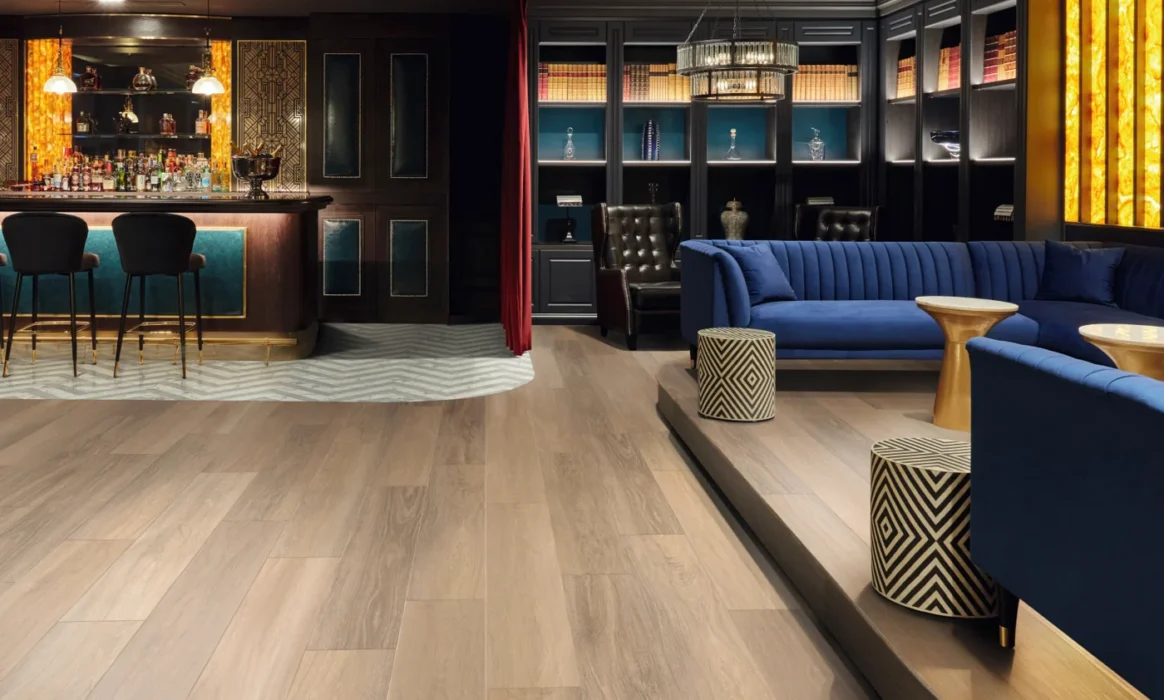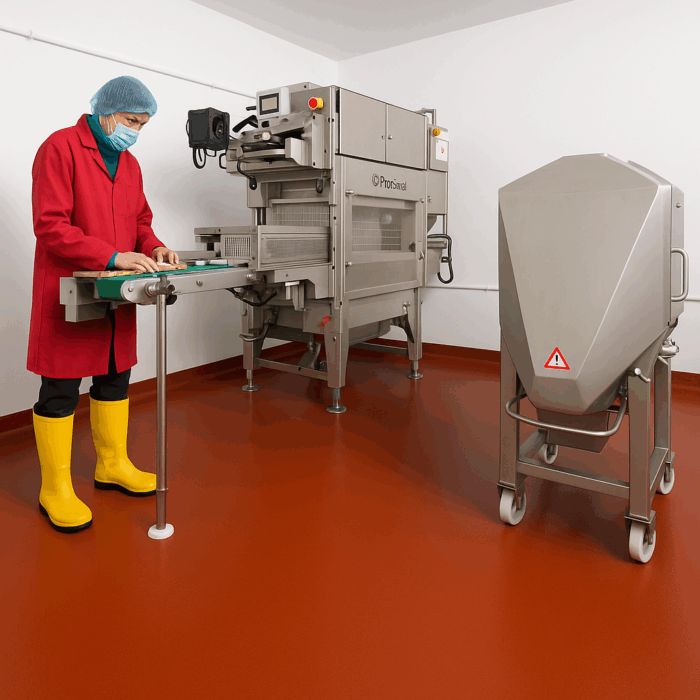Why Commercial Vinyl Flooring Is the Smart Choice for Businesses in the UK
When selecting flooring for commercial buildings such as offices, retail spaces, schools, healthcare facilities, restaurants or showrooms, the right surface must balance aesthetics, durability, safety and ease of maintenance. That’s exactly where commercial vinyl flooring shines.
Below, we explore the key benefits, types and selection tips – and how MacFloor can help you get a floor that works as hard as your business does.
What Is Commercial Vinyl Flooring?
Commercial vinyl flooring (also known as contract vinyl flooring, commercial LVT or vinyl sheet flooring) refers to products designed to withstand heavier footfall and wear than domestic vinyl. These products feature thicker wear layers, reinforced cores, anti-slip surfaces, acoustic backing and extended warranties suited to business environments.
You’ll often find commercial vinyl used in:
Retail stores and showrooms
Office buildings and coworking spaces
Schools, universities and nurseries
Clinics, hospitals and care homes
Restaurants, cafés and hospitality venues
Gyms, wellness centres and common areas
Because it offers so much design flexibility, one surface material can tie together different zones while keeping a consistent look throughout the premises.

7 Key Advantages of Commercial Vinyl Flooring
1. Durability under high traffic
Commercial vinyl floors are engineered for constant use. They resist scratches, dents, scuffs and general wear better than most other materials.
2. Water and moisture resistance
Vinyl is naturally water-resistant, and sealed seams help prevent moisture ingress – ideal for spaces that need regular cleaning.
3. Low maintenance and easy cleaning
A simple routine of sweeping and damp mopping keeps vinyl floors looking fresh. No polishing or refinishing is required, which lowers lifetime maintenance costs.
4. Acoustic performance
Many commercial vinyl systems include sound-reducing layers that help create quieter environments in offices and educational buildings.
5. Wide aesthetic range
Vinyl can convincingly imitate wood, stone, tile or concrete. This allows interior designers to match existing colour schemes or brand identities with ease.
6. Slip resistance and safety
High-quality commercial vinyl flooring comes with built-in slip-resistant coatings and tested R-ratings to help reduce slips and falls.
7. Long-term value
While the initial investment can vary, the combination of long lifespan and minimal maintenance often makes commercial vinyl flooring one of the most cost-effective options on the market.
Choosing the Right Type of Commercial Vinyl Flooring
Not all vinyl is created equal. Here are the key factors to consider:
| Feature | What to Look For |
|---|---|
| Wear layer thickness | For high-traffic areas, choose 0.5 mm or higher. |
| Product type | Sheet vinyl offers seamless coverage; tiles and planks are easier to replace individually. |
| Backing | Acoustic or cushioned backings improve comfort and reduce noise. |
| Slip rating | Check the R-rating to meet health and safety requirements. |
| Installation method | Options include click, glue-down or loose-lay depending on subfloor and usage. |
| Hygiene | Heat-welded seams and smooth finishes make cleaning simple. |
Homogeneous vinyl (a single-layer construction) is popular in healthcare and educational settings where hygiene and durability are top priorities.
Installation and Maintenance Best Practices
A great floor starts with proper preparation. For best results:
Ensure the subfloor is clean, level and dry.
Allow materials to acclimatise to the room temperature before fitting.
Use recommended adhesives to avoid lifting or bubbling.
Heat-weld seams where hygiene and waterproofing are essential.
Follow a regular cleaning schedule using pH-neutral products.
Replace damaged tiles or planks promptly to maintain safety and appearance.
Sectors That Benefit Most from Commercial Vinyl Flooring
Commercial vinyl flooring is suitable for almost any sector, including:
Office buildings – creating a professional look with low maintenance
Retail environments – stylish designs that stand up to constant footfall
Hospitals and clinics – hygienic and easy to clean
Education – practical and safe for classrooms and corridors
Hospitality – attractive finishes for cafés, bars and restaurants
MacFloor has extensive experience installing vinyl flooring across these industries, providing durable and visually appealing solutions that meet every client’s specification.
Why Choose MacFloor for Your Commercial Vinyl Flooring
Specialists in commercial flooring installation
Skilled team experienced with subfloor preparation, welding and finishing
Access to top suppliers and brands including Polyflor, Altro, Forbo and Amtico
Full project management from survey to aftercare
Competitive quotes and professional service throughout
Whether you’re renovating a retail chain, upgrading an office complex or fitting out a healthcare facility, MacFloor can provide the right product and finish for your environment.
Conclusion
If you’re considering a durable, low-maintenance and stylish option for your premises, commercial vinyl flooring is one of the best investments you can make. It combines practical performance with modern aesthetics and provides outstanding long-term value.
Contact MacFloor today to arrange a site visit or quotation – and discover how our expert installation team can help transform your commercial space.
What is the difference between commercial and residential vinyl flooring?
Commercial vinyl is designed for high-traffic use, with thicker wear layers and greater resistance to damage. Residential vinyl is generally thinner and suited to lighter footfall.
How long does commercial vinyl flooring last?
With correct installation and maintenance, commercial vinyl flooring can last 10 to 20 years or more, depending on the environment and level of use.
Is commercial vinyl flooring waterproof?
Yes, most commercial vinyl products are water-resistant, and when seams are correctly sealed or welded, they can provide a fully waterproof surface ideal for kitchens, bathrooms and healthcare areas.
Safety Flooring Explained: Where and Why It’s Required
When it comes to commercial and public spaces, safety should never be an afterthought – especially underfoot. Safety flooring is designed to reduce the risk of slips, trips, and falls, making it a crucial feature in many environments across the UK. But what exactly is safety flooring, where is it required, and how do you choose the right type?

In this post, we’ll break down the essentials of safety flooring and explain why it’s more than just a compliance checkbox – it’s a long-term investment in health, safety, and durability.
What Is Safety Flooring?
Safety flooring, often referred to as non-slip flooring or anti-slip flooring, is a type of specialist floor covering made with slip-resistant materials. These floors are engineered to offer extra grip, even when wet or contaminated, and are most commonly constructed using vinyl, rubber, or resin with embedded particles that enhance traction.
This type of flooring is widely used in areas where spills, moisture, or heavy footfall are common, helping to prevent accidents and meet UK health and safety regulations.
Where are Safety Floors Required?
Safety floors are required or recommended in a wide range of commercial and public settings. Here are some of the most common areas where safety flooring is essential:
🏥 Healthcare Facilities
Hospitals, clinics, and care homes require safety flooring to protect vulnerable patients and busy staff from slipping – especially in wet rooms, corridors, and treatment areas.
🍳 Commercial Kitchens
In professional kitchens, safety flooring must cope with grease, water, and food debris. Anti-slip vinyl flooring is a legal requirement in many food prep areas under UK hygiene and safety laws.
🚽 Toilets & Wet Rooms
Public toilets, changing rooms, and shower facilities are prone to water splashes, making non-slip flooring vital for preventing falls.
🏢 Industrial & Manufacturing Units
Factories, warehouses, and workshops often feature safety flooring in walkways and work zones to reduce injury risk in high-activity areas.
🏫 Schools & Nurseries
Children are particularly prone to slips and tumbles. Installing safety flooring in corridors, washrooms, and activity areas ensures a safer environment.
🛒 Retail & Hospitality
Customer-facing businesses like shops, restaurants, and leisure centres often install safety flooring in entryways, bar areas, and kitchens to protect both customers and staff.
The Legal Side: UK Regulations on Safety Floors
Under the Health and Safety at Work etc. Act 1974 and the Workplace (Health, Safety and Welfare) Regulations 1992, employers and building owners have a legal obligation to provide a safe environment – including floors that are suitable, maintained, and not slippery.
The HSE (Health and Safety Executive) also provides guidelines on preventing slips and trips in the workplace. Choosing the right safety flooring is part of meeting these standards, and failure to do so could result in fines or liability claims.
Key Features to Look for
When selecting flooring for your premises, consider the following features:
- Slip resistance rating (R10, R11, etc.)
- Water and chemical resistance
- Ease of cleaning and maintenance
- Hygienic properties (ideal for healthcare or food settings)
- Durability and load-bearing capacity
- Fire safety compliance
Trusted brands like Altro, Polyflor, and Gerflor offer a wide range of safety flooring options that meet these requirements and more.
Why Work with MacFloor?
At MacFloor, we specialise in the supply and installation of high-quality safety flooring across the East Midlands and beyond. Our expert team has years of experience working in healthcare, education, retail, and industrial settings, and we’re approved installers for leading safety flooring brands.
We offer:
- Free site surveys and professional advice
- Full compliance with UK safety standards
- Efficient installation with minimal disruption
- Tailored solutions to suit your space and budget
If you’re unsure which flooring is right for your premises, we’re here to help you make an informed, compliant, and long-lasting choice.
Safety flooring isn’t just about ticking a box – it’s about actively preventing accidents, safeguarding people, and ensuring your premises comply with the law. Whether you’re fitting out a kitchen, hospital, warehouse or public toilet, choosing the right flooring can make all the difference.
To discuss your project or request a free quote, get in touch with the team at MacFloor today.
Top Trends in Industrial Flooring for Food Facilities in 2025
The Role of Industrial Flooring in Food Production
In the UK’s food manufacturing sector, industrial flooring plays a pivotal role in meeting hygiene, safety, and operational efficiency standards. Traditionally utilitarian, flooring today is evolving – not just functionally, but also in terms of sustainability and visual appeal.

Seamless and Hygienic Floors
Perhaps the dominant trend is the shift toward seamless resin flooring. By avoiding grout and joints found in traditional tile or concrete, seamless resin – such as polyurethane (PU) screeds – eliminates areas where bacteria might harbour. These smooth, impervious surfaces simplify cleaning processes and reduce contamination risks – a game‑changer for food production and hygienic environments.
Chemical & Thermal Resilience
Food processing environments are exposed to rigorous cleaning agents and intense temperature shifts. Modern industrial flooring must therefore resist thermal shock and corrosive chemicals. Heavy‑duty polyurethane resin systems can endure heat up to 120 °C and aggressive sanitisers, ensuring longevity even under the harshest conditions.
Sustainable Flooring Solutions
Environmental credentials now matter. In response, resin flooring manufacturers are developing low‑VOC products and incorporating bio‑based resins sourced from renewables. The goal? To minimise installation impact, reduce waste over time, and align with ESG priorities. Durable systems that stand the test of time help avoid premature replacements and adverse environmental outcomes.
Speedy Installation & Reduced Downtime
Floor replacement often means lost production time – and revenue. To tackle this, rapid‑cure resin systems have been introduced. These harden quickly and allow phased installations, enabling sections of a facility to stay operational while new flooring is applied elsewhere . Faster turnaround means less disruption and on-going production continuity.
Safety Through Colour-Coding & Zoning
Another key development is the use of colour-coded resin floors to delineate zones: walkways, processing areas, spill zones, and emergency routes. This enhances compliance with UK Health & Safety Executive (HSE) guidelines and boosts visual management. Anti‑slip textures further reduce risks in wet or greasy areas, making industrial flooring not only hygienic, but safe for staff.
Aesthetic Finishes & Brand Identity
Even in industrial spaces, aesthetics are gaining traction. Food plants with visitor areas – such as open kitchens or tasting rooms – opt for glossy decorative resins, custom logos, and tailor‑made textures. These design elements reinforce brand identity and reflect investment in quality – without compromising on industrial-grade performance.
Challenges in Installation & Maintenance
Achieving peak performance from industrial flooring hinges on proper specification and installation. Substrate preparation, managing moisture levels, and controlling worksite conditions are crucial. Training personnel on correct cleaning and maintenance is vital to protect the integrity of the floor long term. Though initial costs may be higher, extended lifespan and reduced replacement needs typically offer better ROI.
The Future: Smart & Antimicrobial Floors
Looking forward, expect smart flooring with embedded sensors to monitor temperature, chemical exposure or wear – ideal for compliance and proactive maintenance. Antimicrobial resin additives will become more widespread. Additionally, Building Information Modelling (BIM) tools will help architects and contractors accurately specify flooring systems during planning. As UK regulations around pathogens such as listeria tighten, correct installation and monitoring of industrial flooring will be indispensable.
Conclusion: Industrial Flooring at the Forefront
In 2025, industrial flooring in the UK food sector is no longer only about strength. It must be:
- Hygienic – seamless and bacteria-resistant
- Resilient – chemical and thermal hard-wearing
- Sustainable – low-VOC, renewable-sourced, long-lasting
- Operational – fast-curing with minimal downtime
- Safe – colour-zoned, slip-resistant
- Aesthetic – visually aligned with brand presentation
- Future-ready – sensor-equipped and antimicrobial
Food processing businesses that invest in high-performance industrial flooring systems can expect cleaner facilities, stronger safety records, uninterrupted production, and greater sustainability throughout the building’s lifecycle.
At the heart of these trends lies the undeniable truth: well-chosen industrial flooring supports hygiene, boosts productivity, and signals a commitment to excellence. In an increasingly demanding regulatory and consumer landscape, that’s an advantage no food facility can afford to ignore.
Contact us today for more info on Industrial/Hygienic Flooring options
Eco-friendly Flooring Solutions: Tips for Homeowners
When it comes to renovating or building a home, flooring is often one of the most exciting parts to choose — it sets the tone, style, and comfort of your space. But have you ever paused to consider the environmental impact of your choice, and whether you’re opting for eco-friendly flooring solutions?
Today, more homeowners are thinking beyond appearance and cost. Sustainability, eco-friendliness, and environmental responsibility are becoming major factors in decision-making — and for good reason. The flooring you choose can impact everything from indoor air quality to deforestation, landfill waste, and your overall carbon footprint.
Let’s explore how different flooring solutions materials affect the environment and what you can do to make more eco-conscious choices — with the help of the best eco-friendly solutions provider.
1. Why Flooring Choices Matter to the Environment
Flooring might seem like a minor component in your home, but consider this: millions of square meters of flooring are manufactured, transported, and replaced each year across the globe.
Each type of flooring comes with its own environmental footprint based on:
- Raw materials used
- Manufacturing process
- Transportation distance
- Installation methods
- Lifespan and recyclability
By choosing eco-friendly flooring services, you can significantly reduce your home’s environmental impact.
2. The Good, the Bad & the Not-So-Green Flooring Options
Let’s take a closer look at some common flooring types and how they rank in terms of sustainability.
Hardwood Flooring Solutions
The Pros:
- Natural and biodegradable
- Can be sourced from sustainable forests (look for FSC certification)
The Cons:
- Risk of contributing to deforestation if not sourced responsibly
- Requires sealing/finishing, which may contain chemicals
Eco-Friendly Tip: Choose reclaimed wood or options certified by the Forest Stewardship Council (FSC).
Vinyl & Laminate Flooring Solutions
The Pros:
- Affordable and low-maintenance
- Durable and water-resistant
The Cons:
- Made from synthetic materials like PVC and plastic resins
- Non-biodegradable and difficult to recycle
- Emissions during production and disposal can harm the environment
Eco-friendly Tip: If you must go with vinyl, look for low-VOC (volatile organic compound) options and suppliers offering recycling programs.
Bamboo Flooring Solutions
The Pros:
- Grows quickly and regenerates without replanting
- Durable and stylish
- Low carbon footprint when processed locally
The Cons:
- Must be processed and transported (watch out for high emissions if it’s shipped internationally)
Eco-friendly Tip: Ensure it’s sourced from ethical farms with minimal chemical treatment.
Carpeting Flooring Solutions
The Pros:
- Soft underfoot and good insulation
- Available in natural fibers like wool or jute
The Cons:
- Synthetic carpets often contain plastics and chemical dyes
- Prone to trapping allergens and dust
Eco-friendly Tip: Choose carpets made of recycled or natural materials with low VOC emissions.
Stone & Tile Flooring Solution
The Pros:
- Long lifespan and durability
- Natural material (stone, clay, etc.)
The Cons:
- High energy use during production (especially ceramic and porcelain tiles)
- Heavy materials = higher transport emissions
Eco-friendly Tip: Choose local stone when possible to reduce shipping emissions.
3. What to Look for in an Eco-Friendly Flooring Solution?
If you’re serious about making a sustainable choice, it’s important to work with a team that shares your values. The best flooring service provider will offer:
- Transparent sourcing information
- Certifications for sustainable products (FSC, GREENGUARD, etc.)
- Advice on low-VOC adhesives and finishes
- Options for recycling or responsible disposal of old flooring
A professional team offering flooring solutions will also help you compare life cycle costs — some eco-options may cost more upfront but last longer and perform better over time.
4. Installation & Disposal: Often Overlooked, But Critical
Choosing the material is only half the story. The way flooring is installed and what happens at the end of its life matters too.
- Eco-Friendly Flooring Installation: Use water-based adhesives and avoid finishes with high VOC levels.
- Recycling & Reuse: Many flooring types, like hardwood, can be reclaimed and reused. Some vinyl and carpet companies offer take-back programs.
Work with flooring services that prioritise minimal waste and responsible disposal.
5. Why This Matters More Than Ever
Climate change, pollution, and resource scarcity aren’t future issues — they’re happening now. Making mindful choices for your home sends a ripple effect through supply chains and industries.
It’s not about being perfect. It’s about making better choices where we can. If thousands of homeowners choose responsibly sourced floors this year, it can have a major impact.
6. Ready to Make a Greener Flooring Decision?
At MacFloor, we’re committed to guiding homeowners through smart, sustainable flooring decisions. Whether you’re planning a new build, a renovation, or a simple room update, our experts can walk you through eco-conscious options that don’t compromise on quality or style.
We believe in being more than a flooring service — we aim to be the best flooring service provider by delivering not only great floors but great advice for a better planet.
Final Thoughts
Your flooring doesn’t just support your home — it reflects your values. With so many green options available today, there’s no reason not to align your style with sustainability.
Choose smart. Choose sustainably. And choose a partner who cares about more than just your floor — choose one who cares about your future.
Best Commercial Flooring Solutions for High-Traffic Spaces
In high-traffic commercial environments, flooring plays a crucial role—not just in terms of aesthetics, but in durability, safety, and ongoing maintenance costs. Whether it’s a busy office building, retail store, school, or transport hub, your floor has to withstand the constant pressures of footfall, furniture, cleaning regimes, and more. Choosing the right commercial flooring solutions ensures long-term performance, safety, and cost efficiency in demanding environments.
At MacFloor, we specialise in commercial flooring solutions that strike the perfect balance between performance and design. In this article, we’ll take a look at the best types of flooring for high-traffic areas and why they’re so effective in commercial settings.
What Makes a Floor Suitable for High-Traffic Commercial Spaces?
Before diving into the flooring types, let’s define what makes flooring suitable for high-traffic use:
- Durability: Can it stand up to constant footfall and movement of furniture or equipment?
- Slip resistance: Safety is paramount in commercial spaces, especially where moisture or spills are common.
- Ease of maintenance: Floors should be quick and easy to clean, with minimal disruption.
- Aesthetic appeal: First impressions count, particularly in customer-facing spaces.
- Longevity: A good commercial floor should last years without needing constant repair or replacement.
Now let’s explore the top flooring options.
1. Luxury Vinyl Tile (LVT)
Luxury Vinyl Tile is one of the most popular commercial flooring solutions for good reason. It offers the appearance of natural materials—like stone, ceramic, or wood—while delivering superior durability and resistance to wear and tear.
Why it works for high-traffic areas:
- Scratch and stain-resistant
- Easy to clean and maintain
- Water-resistant (ideal for areas prone to spills)
- Available in a huge range of styles and finishes
LVT is perfect for retail shops, offices, hospitality venues, and healthcare environments where both aesthetics and practicality are key.
2. Carpet Tiles
Carpet tiles are a great commercial flooring solution for environments that want to combine comfort with practicality. They’re particularly effective in offices and educational settings where noise reduction is a priority.
Why they work:
- Easily replaceable in high-wear zones
- Provide excellent acoustic insulation
- Durable and cost-effective
- Wide variety of colours, textures and designs
In busy open-plan offices, carpet tiles help to soften sound, increase comfort underfoot, and add visual warmth to a space.
3. Safety Vinyl Flooring
Safety vinyl is a specialist commercial flooring solution designed for environments where slip resistance and hygiene are critical.
Why it’s ideal:
- R10-R13 slip ratings available for different use cases
- Easy to deep clean and disinfect
- Welded seams for hygienic installation
- Resistant to chemicals, abrasions, and moisture
Safety vinyl ensures compliance with HSE regulations and is a vital component in environments where hygiene and safety are essential.
4. Rubber Flooring
Rubber flooring is one of the toughest and most shock-absorbent surfaces available, making it ideal for gyms, transport hubs, or industrial environments.
Key benefits:
- High slip resistance
- Absorbs impact and sound
- Very long lifespan
- Resistant to water, oil and chemicals
Though slightly more expensive than vinyl options, the longevity and performance of rubber flooring often make it a cost-effective choice in the long run.
5. Porcelain Tiles
Porcelain tiles are a premium commercial flooring solution ideal for high-traffic areas that require both durability and design impact.
Why porcelain is popular:
- Extremely durable and wear-resistant
- Elegant, premium look
- Low porosity makes it easy to clean
- Excellent underfloor heating compatibility
Porcelain is a great option when you want a high-end finish that still stands up to daily use.
Final Thoughts
When choosing flooring for a high-traffic commercial space, the decision should go beyond just looks. The right commercial flooring solutions will enhance safety, simplify maintenance, and deliver long-term value. At MacFloor, we work closely with business owners, architects, and contractors to recommend flooring solutions tailored to each project’s specific demands.
Need help choosing the perfect flooring for your commercial space? Contact MacFloor today for expert advice, samples, or to schedule a site visit.
The Ultimate Guide to Choosing the Right Commercial Flooring
When designing or refurbishing a commercial space, flooring is one of the most critical elements to consider. Not only does it need to complement the overall aesthetics of the environment, but it also must withstand heavy foot traffic, provide safety, and ensure durability. Whether you are managing an office, retail outlet, healthcare facility, or hospitality venue, selecting the right commercial flooring can enhance the functionality and appearance of your space.
This guide will walk you through the essential factors to consider when choosing commercial flooring, along with highlighting the role of trusted suppliers and fitters like MacFloor.
Key Factors to Consider When Selecting Commercial Flooring
- Durability and Longevity Commercial spaces experience significantly higher foot traffic than residential properties. Therefore, durability is paramount. Flooring materials such as luxury vinyl tiles (LVT), ceramic tiles, and polished concrete are known for their robustness.
- Safety and Compliance Safety is a top priority in any commercial environment. Ensure the flooring meets the required safety standards, such as slip resistance and fire ratings. For example, healthcare facilities and kitchens require flooring with high slip resistance to reduce the risk of accidents.
- Ease of Maintenance Frequent cleaning is necessary in commercial settings to maintain hygiene and aesthetics. Flooring options such as vinyl and laminate are popular due to their low maintenance requirements.
- Aesthetic Appeal The look and feel of your flooring should align with your brand’s identity and the desired ambiance of the space. Warm wood tones may work well in a retail store, while sleek tiles or concrete can create a modern, professional feel in an office.
- Acoustic Properties Noise reduction is essential in environments such as offices and schools. Carpet tiles and rubber flooring are excellent choices for improving acoustics.
- Cost-Effectiveness While staying within budget is crucial, consider the long-term value of your flooring. Investing in high-quality materials and expert installation will reduce repair and replacement costs over time.
Popular Commercial Flooring Options
- Luxury Vinyl Tiles (LVT): Offers the look of natural materials like wood or stone while being more durable and cost-effective.
- Carpet Tiles: Ideal for offices, providing comfort underfoot and excellent sound absorption.
- Ceramic and Porcelain Tiles: Perfect for areas requiring water resistance, such as bathrooms and kitchens.
- Rubber Flooring: Commonly used in gyms and schools due to its durability and cushioning properties.
- Polished Concrete: A trendy option for industrial-style spaces, known for its longevity and minimal maintenance.
Why Choose MacFloor?
When it comes to commercial flooring, working with a reliable supplier and fitter is essential for achieving the best results. MacFloor is a trusted name in the industry, offering a comprehensive range of commercial flooring solutions and expert installation services.
What Sets MacFloor Apart?
- Extensive Product Range MacFloor provides a wide selection of high-quality flooring materials, including LVT, carpet tiles, rubber, and ceramic tiles. This allows businesses to choose the perfect option tailored to their specific needs.
- Expert Installation Services Proper installation is key to ensuring the longevity of your flooring. MacFloor’s team of skilled fitters has years of experience in fitting all types of commercial flooring, ensuring a flawless finish every time.
- Bespoke Solutions Every commercial space is unique. MacFloor works closely with clients to provide bespoke flooring solutions that meet both functional requirements and design preferences.
- Commitment to Quality and Compliance MacFloor adheres to all industry regulations and safety standards, giving clients peace of mind that their flooring meets necessary compliance requirements.
Final Thoughts
Choosing the right commercial flooring is a significant investment that impacts the look, feel, and functionality of your space. By considering factors such as durability, safety, maintenance, and aesthetics, you can make an informed decision. Partnering with a reputable supplier and fitter like MacFloor ensures that your flooring is not only high-quality but also expertly installed, giving your commercial space the professional finish it deserves.
For more information or to explore their range of commercial flooring solutions, contact MacFloor today and take the first step towards transforming your commercial space.






